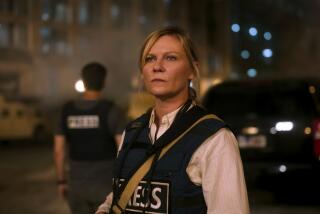It’s movie night on a Baghdad street
The filmmakers set up their screen in front of the abandoned Justice Ministry, propped up a creaky 35-millimeter projector and hoped the crowd would come and watch their film in this place where car bombs recently killed nearly 160 people.
Soldiers and police checked passing cars as a small crowd gathered to watch “Ahlaam,” or “Dreams,” one of the first Iraqi features made since 2003. The movie had been shown around the world and won awards at the Brooklyn International Film Festival, but only now was it making its debut in Baghdad.
The audience included children, not used to outdoor cinema, who thought the crowd was gathering for a funeral. Others in attendance had survived the bloody day in October when two car bombs ripped through a one-block area. A few men shouted out when a suspicious-looking car appeared and then relaxed after inspecting the vehicle.
Looking on at the detritus of concrete and metal bars, the organizers said they wanted to help bring life back to Baghdad. They planned to show movies for three more nights: once in front of the Baghdad governorate building, which had been hit in the same Oct. 25 attack; then at the Foreign Ministry, which was struck in August on a day that saw nearly 100 people killed; and finally at a park on the eastern bank of the Tigris River.
The opening had originally been planned for Oct. 25 in the city’s upscale Karada district, but was postponed after the attack for fear of further bombings.
“In this place, my people were killed. In this same place we [now] gather children and youth,” said one of the film’s stars, Bashir Majid. “This is an effort to bring life back to a dead place.”
As the sky went dark, the projector showed images of the American airstrikes that lighted up Baghdad the first night of the U.S.-led invasion. Then the film settled down to tell the tale of two mental hospital patients, one of them a woman named Ahlaam, and their doctor as they wandered their looted city in the first days after the fall of Saddam Hussein.
The audience strained to watch as street lights switched on and bleached out the movie screen. Images would come into focus only to be wiped away.
Despite the glitches, Majid was happy. The unshaven actor described the “Ahlaam” crew’s harrowing experience filming in this same area in 2004 when Sunni Arab gunmen kidnapped them for a day.
The moviemakers had to convince the armed men that they weren’t working with the Americans or Iraqi government. Finally they were spared, but only after being threatened with death and, according to one of the producers, marched before a mock firing squad.
Their soundman had been shot in the leg during the ordeal, and the group went to the hospital for treatment. There Shiite Muslim militiamen detained them, accused them of being terrorists, beat them and handed them over to the U.S. military, Majid said.
The Americans held them for about a week and released them after the men had given interrogators a copy of their script to prove that they weren’t filming propaganda videos for Sunni gunmen, he added.
The crew and actors debated quitting but decided to carry on.
Their next feature, “Son of Babylon,” has been scheduled to be shown at the Sundance Film Festival next month, and they have also produced a short film about their near-death experience making “Ahlaam.”
Frustrated by the poor viewing conditions Tuesday night, the crowd started to dwindle. Alaa Abdullah, a fishmonger, hung around in hopes of making a few sales.
“I don’t like the movies where they fight and the blood isn’t real,” he said. “The movie star isn’t hurt. These are all lies.”
More to Read
Only good movies
Get the Indie Focus newsletter, Mark Olsen's weekly guide to the world of cinema.
You may occasionally receive promotional content from the Los Angeles Times.






